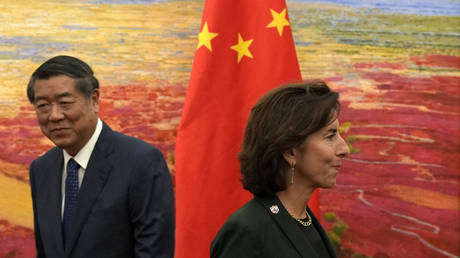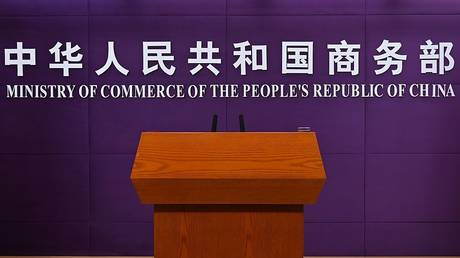
Beijing has made itself ‘uninvestable’, US commerce czar admonishes after her country deployed sanctions, embargoes, and the military to do just that
Hawkish US Secretary of Commerce Gina Raimondo has recently undertaken an official visit to China. She is the 4th such US official to visit in the past few months, marking a stabilization – but not a breakthrough – in ties between the two powers. Here, she berated China for making its market “uninvestable” for US firms and called “on Beijing to act to reduce the risk of doing business in the country.”
This is ironic for too many reasons to list. The most obvious one is that the Biden administration recently released restrictions on US inbound foreign investment into China’s high-tech industries, including semiconductors, quantum computing, supercomputing and artificial intelligence. Although the measures are considered narrow, they are nonetheless the opposite of confidence-inducing, as Republican critics have already argued they are not enough and have demanded they be widened.
This in itself tells a story about America. China isn’t making itself ‘uninvestable’; the US is doing it by deliberately creating a toxic geopolitical environment. The US does not want to see inbound investment into China and – through the stroking of tensions and military uncertainties – is heightening the risks of such investments. This makes Raimondo’s trip to Beijing immensely hypocritical.
Washington’s narrative on China, peddled through compliant media, is that Beijing is primarily responsible for scaring foreign investors away due to its increasing centralization under the rule of Xi Jinping. China is being described as isolationist, rigid, unreasonable and ‘in decline’ and accused of ‘unfair’ economic practices. If only Beijing would open up more and let all these investors in, right? Everything would be fine, and the US-China economic relationship would get back on track, wouldn’t it?
Possibly, but only if the US had not: 1) Placed hundreds of billions of dollars in tariffs on Chinese exports, which it refuses to remove, even with high levels of inflation; 2) Opportunistically blacklisted products from entire regions of China, such as Xinjiang, on the premise of ‘human rights abuses’; 3) Put Chinese technology companies on the commerce department ‘entity list’ prohibiting US companies from exporting to them, then blacklisted the entirety of China’s semiconductor industry and forced third-party countries to do the same.
On top of all the sanctions, the US is deliberately militarizing China’s entire periphery with military bases and stoking up tensions with Taiwan, capitalizing on global uncertainty following the Ukraine war. Last but certainly not least, the mountain of news articles and commentary demonizing, attacking, accusing and doom-mongering about China grows every single day. Can the US honestly say with a straight face amidst all this that it is China who is scaring away investors? Sure, as this global environment has deteriorated, Beijing has tightened its control, and the ruling party engages in harsh regulatory crackdowns against a number of companies, which hardly creates an investment-friendly environment, but that’s a product of the insecurity being driven by tensions.
So when officials like Raimondo visit China and complain the conditions are unfavorable for US businesses, the level of hypocrisy borders on extreme, when Washington itself has done more than anyone else to undermine trust in Beijing. But if that is so, why should she even complain about it? The answer is because the US does not want to have an equal economic relationship with China. Washington’s ideal relationship with Beijing is one in which it gets full access to the Chinese market and gets to sell it anything it wants, not where Chinese companies are able to compete fair and square on a global scale.
This is the same level of subordination it has long sought to impose on Europe, where, for example, it is casually destroying German industry by forcing its decoupling from Russian resources, selling overpriced gas and then using protectionism through the “inflation reduction act” to disincentivise production. The US wants to economically dominate China; that’s the only “investment” it has in mind and is primarily why visits like Raimondo’s never truly make any headway and are a waste of time.




